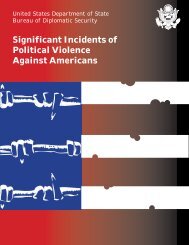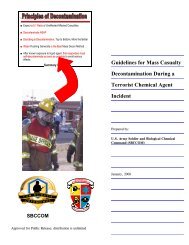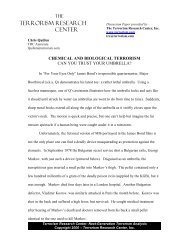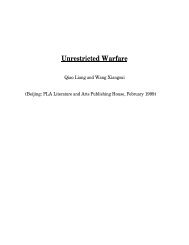Combating Proliferation of Weapons of Mass Destruction
Combating Proliferation of Weapons of Mass Destruction
Combating Proliferation of Weapons of Mass Destruction
You also want an ePaper? Increase the reach of your titles
YUMPU automatically turns print PDFs into web optimized ePapers that Google loves.
qualifications I have suggested if that person would be required to be a subordinate in anexisting agency <strong>of</strong> government and/or not serve directly under, and report directly to, thePresident and Vice President.The Commission has assigned significant new time-consuming duties and responsibilitiesto the Vice President. I question whether the Commission has fully considered whethersuch assignments are realistic given the existing circumstances. In the view <strong>of</strong> thiscommission member, the next eighteen months are absolutely critical in improving andcorrecting our course in this area! We received testimony from the Vice President’s staffcautioning against any significant new responsibilities for the Vice President given hisalready over-burdened important assignments. If one takes into account that the VicePresident will also be running for President for the next eighteen months, a reasonableperson might believe we may be expecting too much <strong>of</strong> the Vice President, given thecircumstances. If this is accurate then the Commission’s penchant for insisting that theVice President be the “key” in carrying out our recommendations we run the risk <strong>of</strong> havingour efforts fail because <strong>of</strong> a fettered key <strong>of</strong>ficial <strong>of</strong> our own making!During our deliberations I have been impressed with the understanding <strong>of</strong> the challengesby all the Cabinet secretaries and the key individuals and groups who work under theirdirection. While we have always had the tendency to blame the bureaucracy for anyfailures, I do not believe that to be the case with the less-than-adequate effort to addressweapons <strong>of</strong> mass destruction. Indeed, the talent and strength <strong>of</strong> the bureaucracy isobvious in this area. In this instance the bureaucracy represents our greatest prospect tosolve the problems. This does not mean that they are currently adequately funded,concentrated, marshaled, directed, or coordinated.My impressions are that <strong>of</strong> all the WMD threats, we are better prepared and working inconcert more with the nuclear threat. This is likely the case because we have been at thisfor half a century. The public and Congress are well aware <strong>of</strong> this threat. Not so with thechemical and biological threat, with the latter apparently the greatest near-term concernfor a catastrophic event by most experts to whom the question was posed. What is clearlyneeded is better direction, coordination, and furtherance <strong>of</strong> a “team” effort, especially inthe chemical and biological areas.I feel that the Commission’s recommendations tend to protect the prerogatives <strong>of</strong> theCabinet secretaries unnecessarily, thereby protecting the individual bureaucracies,thwarting cooperation, and complicating the best chance for a united approach which is amust given the seriousness <strong>of</strong> this threat. Our recommendations diminish the intendedauthority <strong>of</strong> the National Director. It goes without saying that Cabinet secretaries wouldhave the right to appeal any decision to the President. That is a given. However, spelling itout in our report invites a weakened National Director whereas I believe this is where weneed the most strength.170







